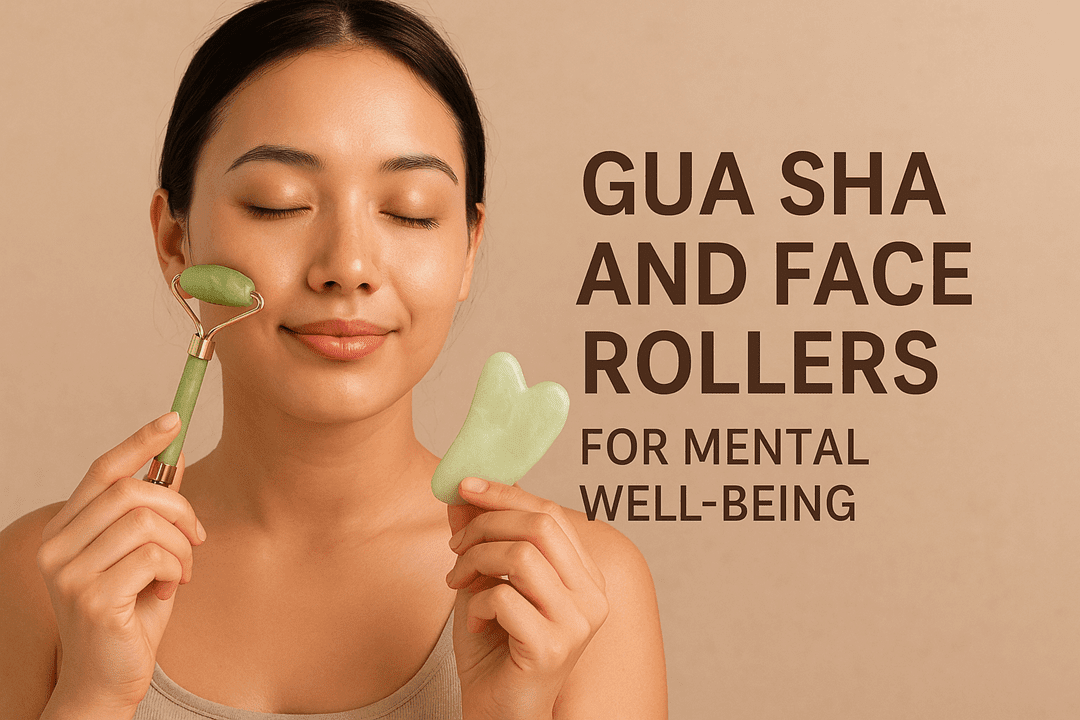
In recent years, gua sha and face roller have become beauty staples in skincare routines across the globe. While most discussions focus on their ability to sculpt the jawline, reduce puffiness, or boost circulation, a growing body of interest is turning toward a different dimension: their impact on mental health and emotional well-being. Beyond external beauty, these tools embody a practice that nurtures both body and mind.
Tradition Meets Modern Wellness
Gua Sha’s Traditional Roots
Originating from Traditional Chinese Medicine (TCM), gua sha was designed to restore the smooth flow of qi and blood. It was never just about relieving muscle tension—it was about harmonizing the whole body, which in turn influenced the mind.
Face Rollers in Modern Beauty
Jade and crystal rollers, though often marketed as beauty gadgets, represent a modern interpretation of the same principle. Their gentle, rhythmic motion promotes relaxation and introduces an element of self-care that extends beyond skincare.
Psychological Benefits of Gua Sha and Face Roller
Stress Relief
Studies suggest that gentle massage stimulates the parasympathetic nervous system, helping the body shift from a “fight or flight” state to a state of relaxation. A nighttime routine with gua sha or a roller can calm the mind and prepare the body for restful sleep.
Mood Enhancement
Massage techniques, even light ones, may trigger the release of endorphins—the body’s natural “feel-good” chemicals. Combined with aromatherapy or crystal rollers (such as rose quartz associated with love and calm), the ritual becomes both physical and emotional therapy.
Self-Care and Ritual
In a fast-paced world, taking five minutes for a facial massage becomes an act of self-kindness. Psychologists have pointed out that such rituals serve as grounding techniques, reducing anxiety and reinforcing self-worth. What appears to be a beauty routine may in fact be a subtle form of mindfulness.
Science and Research
While most clinical studies on gua sha focus on physical health—such as pain relief, circulation, or muscle recovery—there is growing evidence that it can also reduce fatigue and improve sleep quality. Similarly, facial massage techniques, including rollers, have been linked to reduced perceived stress in small-scale trials.
Experts in both dermatology and psychology acknowledge the “mind-skin connection”: stress can trigger skin issues, and skincare rituals that reduce stress can, in turn, benefit overall health.
Practical Applications for Everyday Life
Daily Self-Care Practices
-
Evening ritual: Pair a roller with deep breathing to signal the body it’s time to wind down.
-
Gentle gua sha combined with meditation music for a calming effect.
Tailored Approaches for Different Groups
-
Office workers: Midday roller massage to release tension from screen time.
-
Students: Pre-study gua sha to relax the mind and improve focus.
-
Mothers: Light, mindful massage to ease postpartum stress.
Precautions
It’s important to note that gua sha and rollers are supportive tools—not substitutes for professional mental health care. Individuals with severe psychological conditions should seek medical advice before integrating these practices into their routines.
Culture and Future Trends
On social media platforms like TikTok and Instagram, gua sha and rollers are being rebranded as “wellness essentials.” This reflects a cultural shift: beauty is no longer just about appearance, but about holistic well-being. Looking ahead, we may see these tools integrated with digital health apps or smart wellness devices, bridging ancient wisdom with modern technology.
Gua Sha and Face Roller Conclusion
Gua sha and face rollers are more than skincare accessories; they are tools of connection between body, mind, and spirit. Through stress relief, emotional grounding, and the creation of personal rituals, they can help modern individuals find balance in a fast-moving world. By embracing these practices, beauty becomes not only skin-deep, but a pathway to deeper self-care and mental well-being.

